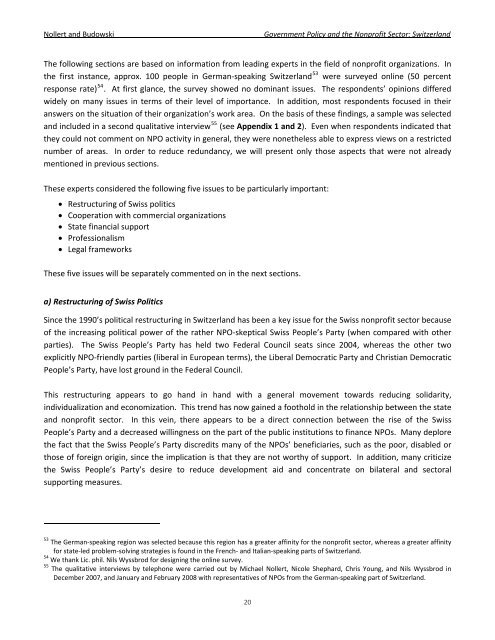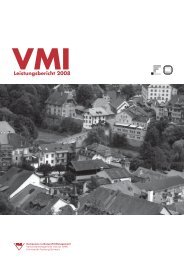Government Policy and the Nonprofit Sector: Switzerland - VMI
Government Policy and the Nonprofit Sector: Switzerland - VMI
Government Policy and the Nonprofit Sector: Switzerland - VMI
- TAGS
- nonprofit
- switzerland
- vmi.ch
You also want an ePaper? Increase the reach of your titles
YUMPU automatically turns print PDFs into web optimized ePapers that Google loves.
Nollert <strong>and</strong> Budowski <strong>Government</strong> <strong>Policy</strong> <strong>and</strong> <strong>the</strong> <strong>Nonprofit</strong> <strong>Sector</strong>: Switzerl<strong>and</strong><br />
The following sections are based on information from leading experts in <strong>the</strong> field of nonprofit organizations. In<br />
<strong>the</strong> first instance, approx. 100 people in German‐speaking Switzerl<strong>and</strong> 53 were surveyed online (50 percent<br />
response rate) 54 . At first glance, <strong>the</strong> survey showed no dominant issues. The respondents’ opinions differed<br />
widely on many issues in terms of <strong>the</strong>ir level of importance. In addition, most respondents focused in <strong>the</strong>ir<br />
answers on <strong>the</strong> situation of <strong>the</strong>ir organization’s work area. On <strong>the</strong> basis of <strong>the</strong>se findings, a sample was selected<br />
<strong>and</strong> included in a second qualitative interview 55 (see Appendix 1 <strong>and</strong> 2). Even when respondents indicated that<br />
<strong>the</strong>y could not comment on NPO activity in general, <strong>the</strong>y were none<strong>the</strong>less able to express views on a restricted<br />
number of areas. In order to reduce redundancy, we will present only those aspects that were not already<br />
mentioned in previous sections.<br />
These experts considered <strong>the</strong> following five issues to be particularly important:<br />
• Restructuring of Swiss politics<br />
• Cooperation with commercial organizations<br />
• State financial support<br />
• Professionalism<br />
• Legal frameworks<br />
These five issues will be separately commented on in <strong>the</strong> next sections.<br />
a) Restructuring of Swiss Politics<br />
Since <strong>the</strong> 1990’s political restructuring in Switzerl<strong>and</strong> has been a key issue for <strong>the</strong> Swiss nonprofit sector because<br />
of <strong>the</strong> increasing political power of <strong>the</strong> ra<strong>the</strong>r NPO‐skeptical Swiss People’s Party (when compared with o<strong>the</strong>r<br />
parties). The Swiss People’s Party has held two Federal Council seats since 2004, whereas <strong>the</strong> o<strong>the</strong>r two<br />
explicitly NPO‐friendly parties (liberal in European terms), <strong>the</strong> Liberal Democratic Party <strong>and</strong> Christian Democratic<br />
People’s Party, have lost ground in <strong>the</strong> Federal Council.<br />
This restructuring appears to go h<strong>and</strong> in h<strong>and</strong> with a general movement towards reducing solidarity,<br />
individualization <strong>and</strong> economization. This trend has now gained a foothold in <strong>the</strong> relationship between <strong>the</strong> state<br />
<strong>and</strong> nonprofit sector. In this vein, <strong>the</strong>re appears to be a direct connection between <strong>the</strong> rise of <strong>the</strong> Swiss<br />
People’s Party <strong>and</strong> a decreased willingness on <strong>the</strong> part of <strong>the</strong> public institutions to finance NPOs. Many deplore<br />
<strong>the</strong> fact that <strong>the</strong> Swiss People’s Party discredits many of <strong>the</strong> NPOs’ beneficiaries, such as <strong>the</strong> poor, disabled or<br />
those of foreign origin, since <strong>the</strong> implication is that <strong>the</strong>y are not worthy of support. In addition, many criticize<br />
<strong>the</strong> Swiss People’s Party’s desire to reduce development aid <strong>and</strong> concentrate on bilateral <strong>and</strong> sectoral<br />
supporting measures.<br />
53 The German‐speaking region was selected because this region has a greater affinity for <strong>the</strong> nonprofit sector, whereas a greater affinity<br />
for state‐led problem‐solving strategies is found in <strong>the</strong> French‐ <strong>and</strong> Italian‐speaking parts of Switzerl<strong>and</strong>.<br />
54 We thank Lic. phil. Nils Wyssbrod for designing <strong>the</strong> online survey.<br />
55 The qualitative interviews by telephone were carried out by Michael Nollert, Nicole Shephard, Chris Young, <strong>and</strong> Nils Wyssbrod in<br />
December 2007, <strong>and</strong> January <strong>and</strong> February 2008 with representatives of NPOs from <strong>the</strong> German‐speaking part of Switzerl<strong>and</strong>.<br />
20











